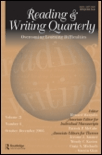
Reading & Writing Quarterly
Scope & Guideline
Exploring the intersection of reading and writing.
Introduction
Aims and Scopes
- Literacy Development and Instruction:
The journal explores various dimensions of literacy development, including reading and writing skills across different age groups and contexts, particularly focusing on struggling readers and writers. - Impact of Technology on Literacy:
Research on how technology, such as speech-to-text tools and online interventions, affects literacy learning and teaching practices is a core area of focus. - Diversity and Inclusion in Literacy Education:
The journal emphasizes studies that address the literacy needs of diverse learners, including students with disabilities, bilingual students, and those from varying socioeconomic backgrounds. - Evidence-Based Interventions and Assessments:
It publishes studies evaluating the effectiveness of literacy interventions and assessments, aiming to provide educators with data-driven insights to enhance teaching and learning. - Cognitive and Affective Dimensions of Literacy:
Research examining the cognitive processes involved in reading and writing, as well as the emotional and motivational factors that influence literacy engagement and achievement, is prominently featured.
Trending and Emerging
- Integration of Technology in Literacy Education:
There is a growing focus on how technology, including AI and multimedia tools, shapes literacy instruction and supports diverse learners, reflecting the increasing reliance on digital resources in education. - Social-Emotional Learning in Literacy:
Emerging research highlights the connection between social-emotional factors and literacy engagement, recognizing the importance of emotional well-being in fostering reading and writing skills. - Interventions for Diverse Learners:
A marked increase in studies targeting interventions for students with disabilities and those from culturally and linguistically diverse backgrounds showcases a commitment to equity in literacy education. - Collaborative and Peer-Based Learning Approaches:
Recent trends emphasize collaborative learning strategies, such as peer-assisted learning and group writing activities, which enhance engagement and literacy outcomes for students. - Research on Reading Fluency and Comprehension:
There is an intensified interest in understanding the relationship between reading fluency and comprehension, particularly in the context of effective instructional practices.
Declining or Waning
- Traditional Literacy Assessment Methods:
There appears to be a decrease in studies focusing on traditional literacy assessments, as the journal increasingly emphasizes innovative and evidence-based assessment practices. - Generalized Literacy Strategies:
Research that presents broad, generalized strategies for literacy instruction is less prominent, with a shift towards more tailored and context-specific approaches. - Basic Phonics Instruction:
There has been a noticeable reduction in papers concentrating solely on basic phonics instruction, suggesting a move towards more comprehensive and integrated literacy instruction models.
Similar Journals

Literacy Research and Instruction
Exploring the forefront of literacy education.Literacy Research and Instruction is a prestigious scholarly journal dedicated to advancing the field of education, with a particular emphasis on literacy research and pedagogical strategies. Published by Routledge Journals, Taylor & Francis Ltd in the United Kingdom, this journal has established itself as a significant resource for scholars, educators, and practitioners engaged in the intricate processes of learning and language acquisition. With an impressive impact factor and a well-regarded position in the Q1 category of Linguistics and Language and Q2 in Education, it is ranked highly among its peers, both in Scopus Ranks and overall academic impact. The journal covers a broad range of topics in literacy education, making it essential reading for those conducting innovative research and seeking evidence-based instructional practices. By providing valuable insights and fostering scholarly discourse, Literacy Research and Instruction plays a vital role in shaping effective literacy education practices worldwide.

Educacao & Formacao
Fostering Innovation in Education and TrainingEducacao & Formacao is a pioneering academic journal published by the State University of Ceará within the Centro de Educação, focusing on the fields of education and teacher training. With an E-ISSN of 2448-3583, this journal has embraced the open access model since 2016, ensuring that high-quality research is freely accessible to educators, researchers, and practitioners globally. The journal serves as a vital platform for disseminating innovative research, critical analyses, and best practices in education, particularly within the Brazilian context and beyond. With its commitment to contributing to the discourse on education, Educacao & Formacao encourages submissions that advance knowledge and foster improvements in educational practices. The journal’s focus on accessibility and engagement makes it an invaluable resource for professionals and students eager to stay abreast of current trends and developments in education.

Australian Journal of Language and Literacy
Illuminating the pathways of language and literacy education.The Australian Journal of Language and Literacy, published by SpringerNature, is an esteemed platform for advancing research in the fields of linguistics, language, and education. With an ISSN of 1038-1562 and an E-ISSN of 1839-4728, this journal has been a crucial resource since its inception in 1997, now converging into its 2024 volume. It proudly holds a significant position within the Q2 category in Linguistics and Language and a Q3 classification in Education for 2023, reflecting its commitment to high-quality scholarly content. With impressive Scopus rankings in arts and humanities and education, it engages a diverse audience of researchers, educators, and linguists. Although this journal is not open access, it remains an essential resource for those seeking to enhance their understanding of language acquisition, literacy development, and pedagogical approaches. By contributing to the discourse in these vital areas, the Australian Journal of Language and Literacy plays a pivotal role in shaping the educational landscape in Australia and beyond.
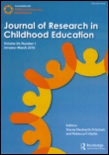
Journal of Research in Childhood Education
Connecting research with real-world educational practices.The Journal of Research in Childhood Education, published by Routledge Journals, Taylor & Francis Ltd, is a prestigious academic journal that has been at the forefront of childhood education research since its inception in 1986. With an ISSN of 0256-8543 and E-ISSN 2150-2641, this journal serves an essential role in disseminating findings and discussions pertinent to the fields of developmental and educational psychology, as demonstrated by its notable rankings in the 2023 Scopus Ranks, placing it in the 66th percentile of Educational Social Sciences and 49th percentile in Developmental Psychology. With a current Q2 category quartile designation in both Developmental and Educational Psychology and Education, it aims to foster a deeper understanding of the complexities surrounding childhood education practices and policies. Researchers, educators, and students alike will find robust and insightful research that contributes to advancing educational theories and practices, supporting the journal's mission to enhance the overall quality of education for children globally. This journal continues to be a critical resource for individuals passionate about enhancing early childhood education and comprehending the developmental challenges faced by children today.

TESL Canada Journal
Empowering Educators with Cutting-Edge InsightsTESL Canada Journal, published by TESL Canada, serves as a vital resource for researchers, educators, and practitioners in the field of English as a Second Language (ESL) and applied linguistics. With its commitment to advancing scholarship and best practices in language education, this esteemed journal fosters a platform for the dissemination of high-quality research and innovative pedagogical approaches. Although it operates without open access, its comprehensive articles and reviews offer valuable insights into current trends and challenges faced by ESL educators across Canada and internationally. The journal is dedicated to promoting a deeper understanding of language acquisition processes and instructional methodologies, contributing significantly to the professional development of its readership. Located in Burnaby, Canada, the journal aims to bridge the gap between theory and practice, making it an indispensable source for educators and researchers looking to enhance their expertise in ESL education.
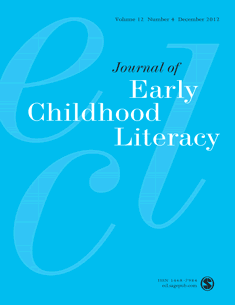
Journal of Early Childhood Literacy
Shaping the Future of Early Literacy ResearchJournal of Early Childhood Literacy, published by SAGE PUBLICATIONS LTD, is a leading international journal dedicated to the exploration and dissemination of research in the field of early childhood literacy. With a robust impact factor and a distinguished ranking in the Q1 category of Education, this journal is at the forefront of publishing innovative studies and theoretical frameworks that shape literacy practices and policies for young learners. Operating from its base in the United Kingdom, it serves as a crucial platform for researchers, educators, and practitioners alike, providing insights into literacy development, pedagogical strategies, and the socio-cultural contexts affecting literacy acquisition. Researchers can access a wealth of articles that reflect the journal’s commitment to advancing knowledge and understanding in early childhood literacy, making it an essential resource for anyone dedicated to fostering literacy in the formative years. The journal has consistently maintained a strong reputation, ranking in the top 82nd percentile among its peers in Social Sciences - Education according to Scopus metrics. Engage with the vibrant discourse and contribute to the evolving landscape of early literacy by exploring the latest findings published in the Journal of Early Childhood Literacy.
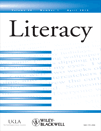
Literacy
Exploring New Frontiers in Language and LearningLiteracy is a premier academic journal published by Wiley, focusing on critical advancements and research in the fields of education and linguistics. With an impressive impact factor reflected in its Q2 ranking in Education and Q1 in Linguistics and Language, this journal serves as a vital platform for researchers, educators, and students seeking to explore contemporary issues surrounding literacy in diverse contexts. Since its inception in 2005, Literacy has made significant contributions to understanding the evolving nature of literacy practices, promoting dialogue on innovative pedagogies and the sociocultural implications of language use. While it is not an Open Access journal, its accessibility through institutional subscriptions ensures that its valuable insights reach a broad audience. With its robust Scopus rankings, including an 88th percentile in Language and Linguistics and 63rd in Education, Literacy remains an indispensable resource for those committed to advancing literacy education and research.
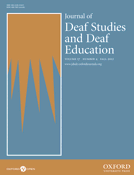
Journal of Deaf Studies and Deaf Education
Driving progress in Deaf studies and educational practices.The Journal of Deaf Studies and Deaf Education, published by Oxford University Press, is a leading scholarly resource that focuses on the multifaceted realm of deaf studies, encompassing linguistic, psychological, educational, and social dimensions related to deafness and hearing impairments. With an impactful presence in both the Education (Q2) and Speech and Hearing (Q2) categories, this journal serves as a critical platform for disseminating innovative research and fostering discourse among professionals, educators, and scholars from across the globe. The journal is indexed in high-reputation databases and ranks prominently within the Scopus rankings, indicating its relevance and influence in the fields of Health Professions and Social Sciences. Published quarterly, the journal facilitates comprehensive access to groundbreaking studies and theoretical advancements that aim to improve educational methodologies and outcomes for deaf and hard-of-hearing individuals. As it celebrates two decades of impactful publication from 2004 to 2024, the Journal of Deaf Studies and Deaf Education continues to champion the scholarly pursuits aimed at enhancing understanding and support for the deaf community.

JOURNAL OF LITERACY RESEARCH
Exploring the depths of literacy studies and practice.JOURNAL OF LITERACY RESEARCH is a leading scholarly journal published by SAGE Publications Inc., dedicated to advancing the field of literacy studies through rigorous research and critical analysis. With an impact factor reflecting its high-quality contributions, this journal has achieved Q1 rankings in both Education and Linguistics and Language, positioning it among the top-tier publications in these fields. The journal has a comprehensive scope that includes various aspects of literacy research, bridging theoretical frameworks and practical applications. Researchers, educators, and students will find valuable insights in its articles, addressing critical issues from emergent literacy to adult education in diverse contexts. Available as an open access resource, the JOURNAL OF LITERACY RESEARCH ensures that cutting-edge research is accessible to a global audience, fostering an inclusive environment for disseminating knowledge and supporting literacy initiatives worldwide. For more information, visit the journal's page at [SAGE Publications](https://journals.sagepub.com/home/jlr).

Innovacion Educativa
Pioneering Innovative Practices for Diverse LearnersInnovacion Educativa, published by the prestigious Universidad de Santiago de Compostela, is a prominent journal dedicated to exploring innovative approaches and practices in the field of education. With an ISSN of 1130-8656 and an E-ISSN of 2340-0056, this journal aims to provide a platform for researchers, educators, and practitioners to disseminate groundbreaking research and insights that enhance educational methods and policies. Although it operates within a traditional access framework, the journal is committed to fostering open dialogue and collaboration among the educational community. With an emphasis on evidence-based practices and contemporary educational challenges, Innovacion Educativa plays a crucial role in shaping the future of education by highlighting innovative methodologies and promoting impactful research that addresses the needs of diverse learners. Its contributions are particularly relevant in today’s rapidly changing educational landscape, making it an essential resource for stakeholders aiming to improve educational outcomes.